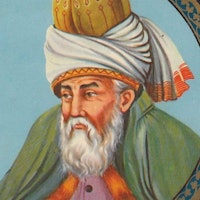Eyesight is in conflict with inner knowing. Always check your inner state with the Lord of your heart.
Eyesight is in conflict with inner knowing. Always check your inner state with the Lord of your heart.
Jalaluddin Mevlana Rumi

Inner Knowing
Topic: Prayer, Meditation, & Contemplation
Eyesight is in conflict with inner knowing. Always check your inner state with the Lord of your heart. A little while alone in your room will prove more valuable than anything else that could ever be given you.
Jalāl al-Dīn Muḥammad Rūmī (born September 30, 1207, in Balkh, present-day Afghanistan – died December 17, 1273, in Konya, present-day Turkey) is revered as one of the world’s greatest poets, mystics, and spiritual teachers. Known in the West simply as Rumi, he was born into a family of scholars and mystics who fled westward during the Mongol invasions, eventually settling in Konya, then part of the Seljuk Empire. Under the guidance of his father, Bahāʾ al-Dīn Walad, Rumi was trained in Islamic theology, jurisprudence, and the contemplative disciplines of the Sufi path. His early years reflected the classical model of a scholar-saint—rooted in devotion, study, and service to his community.
Rumi’s life was transformed by his meeting with the wandering mystic Shams of Tabriz around 1244. Their profound spiritual companionship awakened in Rumi a passion that transcended formal learning and opened him to the depths of divine love. When Shams mysteriously disappeared, Rumi’s grief became the flame that illuminated his poetry and devotion. From this crucible emerged the Mathnawī, often called the “Persian Qur’an,” a six-volume masterpiece that weaves stories, parables, and reflections into a vision of love as the animating force of all creation. His shorter lyric poems, collected in the Divan-e Shams-e Tabrizi, sing of longing, union, loss, and the ecstatic dance between the soul and the Beloved.
Rumi’s teachings centered on the transforming power of divine love, the unity underlying all faiths, and the inward journey from self-centeredness to God-centeredness. He taught that every experience—joy and sorrow, presence and absence—serves as a mirror reflecting the divine mystery. After his passing, his followers established the Mevlevi Order, known for its sacred whirling as a form of remembrance (dhikr). Across eight centuries, Rumi’s voice has transcended language, culture, and creed, inviting seekers into the stillness of the heart where the human and divine meet in love.
The Essential Rumi
Rūmī, Jalāl al-Dīn. The Essential Rumi. Translated by Coleman Barks, HarperCollins, 2004.

Jalaluddin Mevlana Rumi
Theme: Meditation and Contemplation

About This Quotation From Jalāl al-Dīn Rūmī [Commentary]
A Coleman Barks Quote With Commentary
Additional Coleman Barks Quotes
An Additional Rūmī Quote
Resources
Related Quotes
Copyright © 2017 – 2026 LuminaryQuotes.com About Us